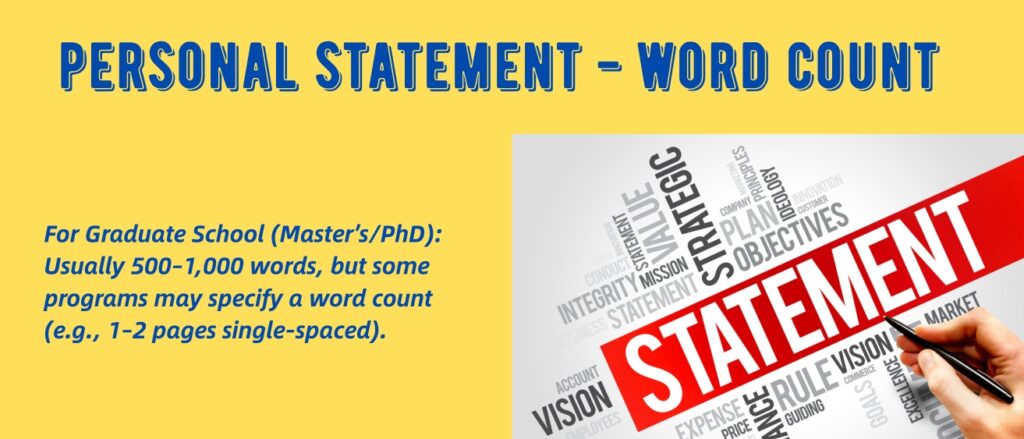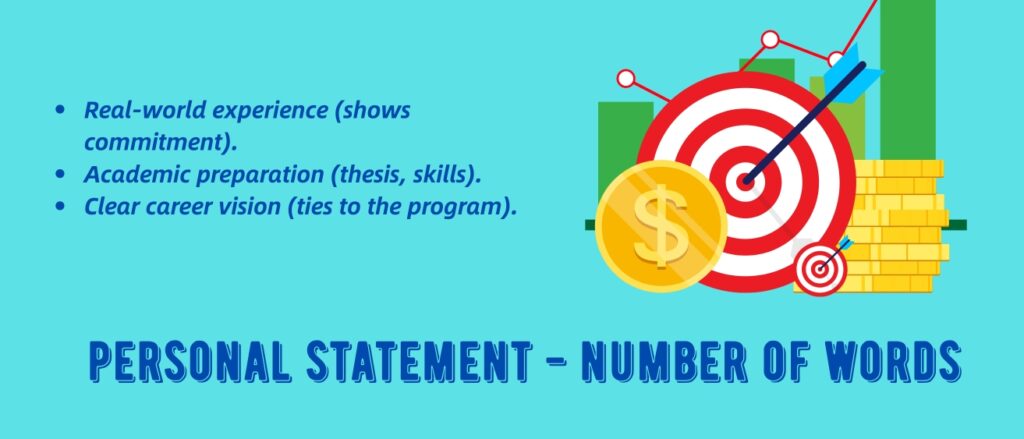The ideal length of a personal statement depends on the specific application requirements, but here are some general guidelines:

For University/College Applications (e.g., UCAS, Common App):
- UCAS (UK universities): 4,000 characters (including spaces) or around 500–600 words.
- Common App (US universities): Typically 250–650 words (the exact limit is usually specified).
- Other universities: Check the specific requirements, but 500–800 words is common.
For Graduate School (Master’s/PhD):
- Usually 500–1,000 words, but some programs may specify a word count (e.g., 1–2 pages single-spaced).
For Job Applications/Scholarships:
- Often 300–500 words, unless otherwise stated.
General Tips:
- Follow instructions strictly—if there’s a word limit, stay within it.
- Be concise and impactful—focus on quality over quantity.
- If no word count is given, aim for 1–2 pages (single-spaced, 12pt font) unless told otherwise.
Here are a few strong personal statement examples for different purposes (shortened for illustration). Use them as inspiration while tailoring your own experiences and voice.

1. University Application (Undergraduate – UCAS-style, ~500 words)
Subject: Psychology
Opening:
*”A single conversation with a homeless man outside my local café changed my perspective forever. His story of mental health struggles sparked my fascination with psychology—how our minds shape our realities. Since then, I’ve devoured books like *The Man Who Mistook His Wife for a Hat, volunteered at a crisis hotline, and conducted an independent research project on cognitive biases. Psychology isn’t just a subject to me; it’s a toolkit for understanding human resilience.”
Key elements:
- Hook (engaging opening).
- Academic curiosity (books, research).
- Relevant experience (volunteering).
- Future goals (linking studies to career aims).
2. Graduate School (Master’s in Public Health – ~600 words)
Focus: Global Health Equity
Excerpt:
“Working in a rural clinic in Ghana, I saw mothers walk miles to access basic vaccines—only to find supplies depleted. This disparity drove me to study health policy, where I analyzed gaps in vaccine distribution for my thesis. My goal is to bridge research and action, ensuring equitable access to care. An MPH at [University] will equip me with the data analysis and leadership skills to drive systemic change.”
Key elements:
- Real-world experience (shows commitment).
- Academic preparation (thesis, skills).
- Clear career vision (ties to the program).
3. Medical School Personal Statement (US – 5300 characters, ~800 words)
Theme: Empathy in Medicine
Excerpt:
“As a scribe in the ER, I watched a doctor kneel beside an elderly patient to explain a terminal diagnosis, holding her hand as she cried. In that moment, I realized medicine isn’t just science—it’s about connecting with people in their most vulnerable states. My work with Alzheimer’s patients and research on palliative care has reinforced this calling. I aspire to be a physician who heals with both knowledge and compassion.”
Key elements:
- Patient interaction story (shows empathy).
- Clinical exposure (scribing, volunteering).
- Research alignment (palliative care).
4. Career Change (MBA Application – ~500 words)
From Engineer to Business Leader
Excerpt:
“Designing solar grids taught me technical problem-solving, but leading a cross-functional team to deploy them in Nigeria revealed my passion for strategy. I now want to pivot from engineering to entrepreneurship, blending my technical background with an MBA’s leadership training to launch a clean-energy startup. At [Business School], I’ll leverage courses like [X] and the [Y] incubator to turn this vision into reality.”
Key elements:
- Clear pivot reason (engineering → business).
- Leadership example (team project).
- School-specific fit (courses, resources).
5. Scholarship/Job Personal Statement (~300 words)
Focus: Community Impact
Excerpt:
“Growing up in a food-insecure neighborhood, I learned early that change starts locally. As a college student, I founded a campus food pantry that now serves 200+ families weekly. This experience taught me the power of grassroots organizing—and the need for sustainable policies. With this scholarship, I’ll pursue a degree in social work to amplify my impact.”
Key elements:
- Personal connection (ties to background).
- Initiative (founded a project).
- Future plans (links funding to goals).
Key Takeaways for All Examples:
- Hook – Start with a vivid anecdote or passion statement.
- Show, don’t tell – Use specific examples (research, volunteering, work).
- Align with the goal – Link your past to future studies/career.
- Be authentic – Let your unique voice shine.
how many word count should a personal statement be
The length of a personal statement depends on the type of application:
For UCAS (UK undergraduate applications):
- Maximum of 4,000 characters (including spaces) or 47 lines, whichever comes first
- Roughly translates to 500–600 words, but focus on character/line limits rather than word count
For US college applications (Common App/Coalition App):
- Typically 250–650 words, with 500–650 words recommended for a strong narrative
- Stay close to the upper limit (e.g., 550–650 words for Common App)
For postgraduate (Master’s) applications:
- Usually around 500 words (one A4 page), though some universities may require up to two pages
Key tips:
- Prioritize clarity and relevance over length
- Draft freely initially, then edit to meet limits
- For UCAS, test formatting in the system to avoid truncation
What are the key elements to include in a personal statement?
A strong personal statement should include the following key elements:
Introduction:
- Start with a compelling hook that reflects your personality and passion for the subject or role. Avoid clichés like “I’ve always wanted to be a…”
- Briefly state your motivation for applying and how it aligns with your goals
Academic/Career Interests:
- Clearly articulate why you’re drawn to the field, supported by relevant coursework, projects, or experiences
- Highlight specific skills or knowledge gained (e.g., research, leadership) with concrete examples
Relevant Experiences:
- Discuss achievements, extracurriculars, or work experiences that demonstrate your suitability. Use active voice and quantify impact where possible
- Reflect on challenges overcome (e.g., pandemic disruptions) and lessons learned
Personal Qualities and Values:
- Showcase 4-5 core values (e.g., curiosity, resilience) through anecdotes
- Differentiate yourself by linking hobbies or interests to the course/job (e.g., a book that inspired your subject choice)
Future Goals:
- Outline how the opportunity fits into your long-term aspirations
- Avoid vague statements; tie goals to the program’s offerings
Conclusion:
- Reinforce enthusiasm and readiness for the next step. Keep it concise and forward-looking
Additional Tips:
- Maintain a professional yet personal tone, using simple, clear language
- Proofread meticulously and seek feedback to refine clarity and flow
- Adhere to word/character limits (e.g., 4,000 characters for UCAS, 500–650 words for Common App)
Avoid plagiarism, exaggeration, or generic statements—focus on authenticity
How can I make my personal statement stand out
To make your personal statement stand out, focus on these key strategies:
1. Start with a compelling hook
- Avoid clichés like “I’ve always wanted to…” and instead open with a vivid anecdote, a thought-provoking question, or a concise statement that reflects your genuine passion for the field
2. Show, don’t just tell
- Use specific examples to illustrate your skills and experiences. For instance, instead of saying “I’m passionate about psychology,” describe a research paper or real-world observation that sparked your interest
- Quantify achievements where possible (e.g., “Led a team of 10 in a community project that raised $5,000”)
3. Demonstrate insight and growth
- Include 3–5 “so what” moments where you reflect on how experiences shaped your values or goals. For example, discuss how volunteering at a clinic reinforced your commitment to healthcare
4. Align with the program’s values
- Research the institution or job’s priorities and tailor your statement accordingly. Mention specific courses, faculty work, or company missions that resonate with you
5. Keep it personal and unique
- Avoid generic quotes or overused templates. Share what sets you apart—unusual hobbies, challenges overcome, or unconventional inspirations
- Maintain a professional yet authentic tone, using active voice and simple language
6. Structure for clarity
- Organize into clear paragraphs: introduction, academic/career interests, relevant experiences, personal qualities, and future goals
- Leave space between paragraphs for readability
7. Edit rigorously
- Proofread for grammar and conciseness. Remove filler words and ensure every sentence adds value
- Seek feedback from mentors or peers to refine your narrative
Example of a standout line:
“When my robotics team’s prototype failed hours before a competition, I realized innovation isn’t about perfection—it’s about resilience. That lesson drives my engineering pursuits.”
By blending specificity, reflection, and authenticity, your statement will leave a lasting impression
What tone should I use in my personal statement
Here’s how to craft a standout personal statement with the right tone and content:
1. Strike the Right Tone
- Semi-formal yet conversational: Write as if speaking to a respected teacher—professional but not stiff. Avoid slang, jargon, or overly complex words
- Confident but humble: Highlight achievements without bragging (e.g., “I contributed to groundbreaking research” vs. “I single-handedly revolutionized the field”)
- Positive and enthusiastic: Frame challenges as learning experiences, not setbacks. Use active verbs like achieved, developed, or discovered
2. Structure for Impact
- Hook: Open with a vivid anecdote or unique perspective (e.g., “A childhood fascination with ant colonies led me to pursue biology”)
- Show, don’t tell: Use specific examples to demonstrate skills. Instead of “I’m a leader,” describe leading a team project
- Reflection: Link experiences to growth. For example, “Teaching ESL revealed my passion for education equity”
3. Avoid Common Pitfalls
- Overly formal or casual tones: Skip stiff phrases (“Henceforth”) and slang (“cool”)
- Negativity or arrogance: Don’t dwell on failures or imply superiority
- Generic clichés: Replace “I’ve always loved science” with a personal story
4. Polish Your Voice
- Read aloud: Ensure it sounds natural, not robotic
- Edit ruthlessly: Cut filler words; every sentence should add value
- Get feedback: Ask mentors if your tone aligns with your personality and goals
Example of strong tone:
“Volunteering at the urban farm taught me resilience—when our tomato crop failed, I researched soil pH and rallied volunteers to replant. This hands-on problem-solving drives my environmental science ambitions.”
By blending authenticity, precision, and energy, your statement will resonate with admissions committees
Are there any common mistakes to avoid in a personal statement
Here are the most common personal statement mistakes to avoid, based on expert guidance:
1. Generic or Vague Content
- Avoid clichés like “I’ve always loved science” or “Ever since I was young…” without concrete examples. Instead, use specific anecdotes or experiences that demonstrate your passion and skills
- Steer clear of broad statements that don’t add value (e.g., “I want to help people” for medical applications)
2. Poor Proofreading
- Grammatical errors, typos, or awkward phrasing can undermine your credibility. Always proofread meticulously and have others review your statement
3. Lack of Focus
- Don’t cram in irrelevant achievements or go off-topic. Every sentence should tie back to your core message or the program’s requirements
- Avoid listing extracurriculars without explaining their relevance
4. Overused Quotes or Gimmicks
- Opening with a famous quote (e.g., Gandhi, Freud) often feels forced. If you use a quote, ensure it directly ties to your narrative
- Unconventional formats (e.g., poems, overly creative layouts) can distract from your content
5. Repeating Application Information
- Don’t regurgitate your CV. Focus on insights, reflections, or unique angles not found elsewhere in your application
6. Inappropriate Tone
- Avoid confessional oversharing (e.g., deeply personal trauma) or preachiness. Stay professional but authentic
- Skip negative language about setbacks; frame challenges as growth opportunities
7. Ignoring Program Fit
- Failing to tailor your statement to the specific school or course is a missed opportunity. Mention unique features of the program that align with your goals
Key Tips to Stand Out:
- Show, don’t tell: Use vivid examples (e.g., “Designing a robot for a competition taught me resilience” vs. “I’m resilient”)
- Reflect, don’t just describe: Explain how experiences shaped your aspirations
- Be concise: Adhere to word limits and cut fluff. Every word should serve a purpose
By avoiding these pitfalls and focusing on authenticity and specificity, your statement will resonate with admissions committees.



